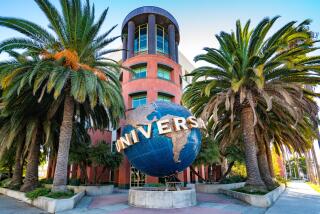Qintex’s Plan to Acquire MGM/UA Falls Apart : Entertainment: The Australian firm is sued for fraud after failing to fulfill promises. Spurned suitor Rupert Murdoch may make another offer.
- Share via
True to Hollywood’s and Wall Street’s most cynical expectations, MGM/UA Communications Co.’s “irrevocable” sale to the Australian Qintex Group collapsed Tuesday amid rancorous accusations and a lawsuit by MGM/UA accusing the Australian firm of fraud.
The $1.5-billion deal--amended twice over the course of seven months--came unglued after Qintex failed to deliver a $50-million letter of credit by Sept. 22 as promised.
The deal’s collapse was a blow to MGM/UA employees as well as to majority owner Kirk Kerkorian, who--after 20 years of selling and repurchasing various MGM assets--appeared genuinely committed to the sale of the entire company.
On another level, the scrapped transaction appears mortifying and costly because two bids by media mogul Rupert Murdoch were spurned in favor of Qintex. In the last go-round, members of the Murdoch camp accused Kerkorian of using their offer to extract a higher price from Qintex.
Murdoch could not be reached for comment late Tuesday, but earlier in the day, he addressed a News Corp. shareholders meeting in Australia and said he might still be interested in MGM/UA, although he wasn’t prepared to raise his bid.
No overtures had been made as of Tuesday night, however. “We are not in contact with MGM, and they are not in contact with us,” said Barry Diller, chairman of Fox Inc., another Murdoch-controlled entertainment conglomerate that participated in the earlier MGM/UA bids.
Executives at rival Hollywood studios predicted privately that Murdoch will step up again--but perhaps at a lower price. “I think Rupert wanted it badly,” said one entertainment executive.
Qintex’s entrepreneurial chairman, Christopher C. Skase, was unavailable for comment, but the company issued a copy of an Oct. 11 letter to the Brisbane Stock Exchange that expressed Qintex’s version of recent developments.
Skase said Qintex had posted security for the $50-million letter of credit but received “subsequent demands” from MGM/UA, including additional letters of credit and “substantial liquidated damage” which, in Qintex’s view, were proposed in bad faith.
MGM/UA’s demands “shifted daily and, in essence, reflected an attempt by MGM to extract higher economic value,” resulting in Qintex’s ultimate determination that acceding to the financial requests would not be in the best interest of Qintex’s shareholders, Skase wrote.
Skase’s version was denounced by MGM/UA’s lead attorney as “a bald-faced lie.” Terry Christensen, the attorney who has worked closely with Kerkorian for two decades, declared in a telephone interview that “the letter is patently absurd and ignores the fact that they were in default when they woke up on the morning of Sept. 23.”
When asked to assess Kerkorian’s personal reaction, Christensen said “he feels badly” that Skase couldn’t complete the deal.
At MGM/UA’s headquarters in Beverly Hills, company Chairman Jeffrey C. Barbakow read a brief statement from Kerkorian. “We were extremely disappointed. We tried to hold the transaction together in every possible way that we could think of. Finally it became clear to the board that Qintex could not perform.”
Barbakow ticked off several of the solutions proposed by MGM/UA, to no avail. The company offered to reduce the letter of credit or to accept substitute security, or even a favorable opinion from an investment banker on Qintex’s behalf, he said. MGM/UA also proposed that Qintex could proceed without a letter of credit if it agreed to allow MGM/UA to consider a better offer.
Kerkorian’s own company, Tracinda Corp., indicated a willingness to help finance up to $135 million of the acquisition cost, without requiring voting rights in the surviving corporation, Barbakow said.
But Qintex’s final proposal, according to Barbakow, was “to eliminate the letter of credit or any other security” and to postpone for two months the closing date of the deal. MGM/UA would also have been required to invest in Qintex “without any confirmation from Qintex of its ability to perform.” The upshot was “we had no choice other than to terminate the agreement,” Barbakow said.
Firm Files Suit
Evidence surfaced last week that Qintex was having difficulty delivering the non-refundable payment, but the company told the Brisbane Stock Exchange that it had posted security with a bank to obtain the letter of credit, and Qintex executives publicly expressed confidence that the deal was on track.
Attorneys for MGM/UA filed a lawsuit Tuesday in U.S. District Court in Los Angeles against Qintex Australia Ltd., alleging breach of contract, fraud and negligent misrepresentation, among other things.
In the 12-page complaint, MGM/UA said Qintex induced MGM/UA to reject Murdoch’s cash offer last month of $23.16 per share. As a result, MGM/UA said it has suffered damages exceeding $50 million.
The scrapped deal was announced after the close of trading. On the New York Stock Exchange, MGM/UA lost 62.5 cents a share to close at $21, on volume of 79,800 shares. In the over-the-counter market, Qintex closed at $5.625 a share, off 25 cents, on volume of 45,800 shares.
More to Read
The biggest entertainment stories
Get our big stories about Hollywood, film, television, music, arts, culture and more right in your inbox as soon as they publish.
You may occasionally receive promotional content from the Los Angeles Times.









